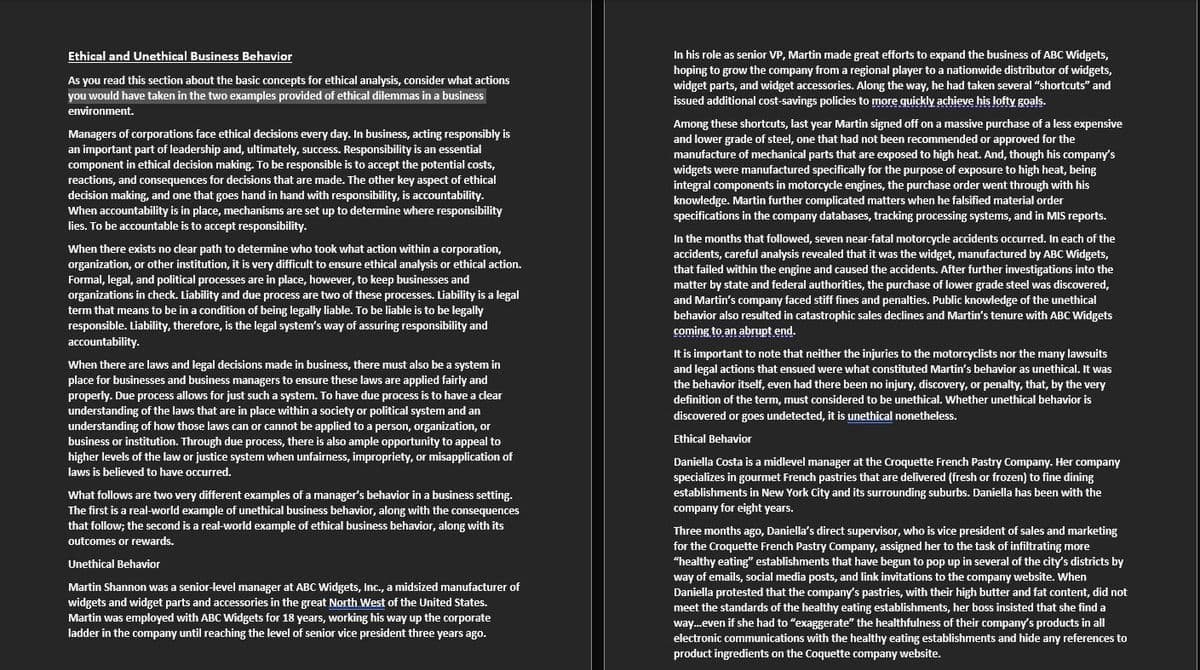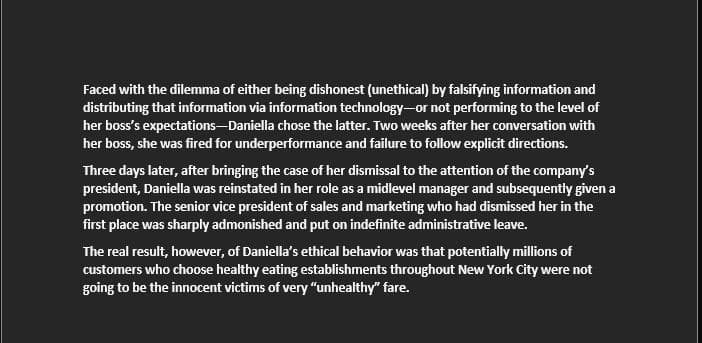Q4- As you learned in the Learning Activity titled “Ethical and Unethical Business Behavior,” ( managers of corporations face ethical decisions daily. Who is the senior-level manager at ABC Widgets, Inc. in the unethical behavior example? What type of training would you recommend to ensure employees are equipped to make ethical decisions and to avoid what the senior-level manager at ABC Widgets did? What processes could you put in place to allow employees to make anonymous reports of unethical behavior? Finally, who would you designate to administer and manage ethical issues?
Q4- As you learned in the Learning Activity titled “Ethical and Unethical Business Behavior,” ( managers of corporations face ethical decisions daily. Who is the senior-level manager at ABC Widgets, Inc. in the unethical behavior example? What type of training would you recommend to ensure employees are equipped to make ethical decisions and to avoid what the senior-level manager at ABC Widgets did? What processes could you put in place to allow employees to make anonymous reports of unethical behavior? Finally, who would you designate to administer and manage ethical issues?
Chapter1: Taking Risks And Making Profits Within The Dynamic Business Environment
Section: Chapter Questions
Problem 1CE
Related questions
Question
Q4- As you learned in the Learning Activity titled “

Transcribed Image Text:Ethical and Unethical Business Behavior
As you read this section about the basic concepts for ethical analysis, consider what actions
you would have taken in the two examples provided of ethical dilemmas in a business
environment.
Managers of corporations face ethical decisions every day. In business, acting responsibly is
an important part of leadership and, ultimately, success. Responsibility is an essential
component in ethical decision making. To be responsible is to accept the potential costs,
reactions, and consequences for decisions that are made. The other key aspect of ethical
decision making, and one that goes hand in hand with responsibility, is accountability.
When accountability is in place, mechanisms are set up to determine where responsibility
lies. To be accountable is to accept responsibility.
When there exists no clear path to determine who took what action within a corporation,
organization, or other institution, it is very difficult to ensure ethical analysis or ethical action.
Formal, legal, and political processes are in place, however, to keep businesses and
organizations in check. Liability and due process are two of these processes. Liability is a legal
term that means to be in a condition of being legally liable. To be liable is to be legally
responsible. Liability, therefore, is the legal system's way of assuring responsibility and
accountability.
When there are laws and legal decisions made in business, there must also be a system in
place for businesses and business managers to ensure these laws are applied fairly and
properly. Due process allows for just such a system. To have due process is to have a clear
understanding of the laws that are in place within a society or political system and an
understanding of how those laws can or cannot be applied to a person, organization, or
business or institution. Through due process, there is also ample opportunity to appeal to
higher levels of the law or justice system when unfairness, impropriety, or misapplication of
laws is believed to have occurred.
What follows are two very different examples of a manager's behavior in a business setting.
The first is a real-world example of unethical business behavior, along with the consequences
that follow; the second is a real-world example of ethical business behavior, along with its
outcomes or rewards.
Unethical Behavior
Martin Shannon was a senior-level manager at ABC Widgets, Inc., a midsized manufacturer of
widgets and widget parts and accessories in the great North West of the United States.
Martin was employed with ABC Widgets for 18 years, working his way up the corporate
ladder in the company until reaching the level of senior vice president three years ago.
In his role as senior VP, Martin made great efforts to expand the business of ABC Widgets,
hoping to grow the company from a regional player to a nationwide distributor of widgets,
widget parts, and widget accessories. Along the way, he had taken several "shortcuts" and
issued additional cost-savings policies to more quickly achieve his lofty goals.
Among these shortcuts, last year Martin signed off on a massive purchase of a less expensive
and lower grade of steel, one that had not been recommended or approved for the
manufacture of mechanical parts that are exposed to high heat. And, though his company's
widgets were manufactured specifically for the purpose of exposure to high heat, being
integral components in motorcycle engines, the purchase order went through with his
knowledge. Martin further complicated matters when he falsified material order
specifications in the company databases, tracking processing systems, and in MIS reports.
In the months that followed, seven near-fatal motorcycle accidents occurred. In each of the
accidents, careful analysis revealed that it was the widget, manufactured by ABC Widgets,
that failed within the engine and caused the accidents. After further investigations into the
matter by state and federal authorities, the purchase of lower grade steel was discovered,
and Martin's company faced stiff fines and penalties. Public knowledge of the unethical
behavior also resulted in catastrophic sales declines and Martin's tenure with ABC Widgets
coming to an abrupt end.
It is important to note that neither the injuries to the motorcyclists nor the many lawsuits
and legal actions that ensued were what constituted Martin's behavior as unethical. It was
the behavior itself, even had there been no injury, discovery, or penalty, that, by the very
definition of the term, must considered to be unethical. Whether unethical behavior is
discovered or goes undetected, it is unethical nonetheless.
Ethical Behavior
Daniella Costa is a midlevel manager at the Croquette French Pastry Company. Her company
specializes in gourmet French pastries that are delivered (fresh or frozen) to fine dining
establishments in New York City and its surrounding suburbs. Daniella has been with the
company for eight years.
Three months ago, Daniella's direct supervisor, who is vice president of sales and marketing
for the Croquette French Pastry Company, assigned her to the task of infiltrating more
"healthy eating" establishments that have begun to pop up in several of the city's districts by
way of emails, social media posts, and link invitations to the company website. When
Daniella protested that the company's pastries, with their high butter and fat content, did not
meet the standards of the healthy eating establishments, her boss insisted that she find a
way...even if she had to "exaggerate" the healthfulness of their company's products in all
electronic communications with the healthy eating establishments and hide any references to
product ingredients on the Coquette company website.

Transcribed Image Text:Faced with the dilemma of either being dishonest (unethical) by falsifying information and
distributing that information via information technology or not performing to the level of
her boss's expectations-Daniella chose the latter. Two weeks after her conversation with
her boss, she was fired for underperformance and failure to follow explicit directions.
Three days later, after bringing the case of her dismissal to the attention of the company's
president, Daniella was reinstated in her role as a midlevel manager and subsequently given a
promotion. The senior vice president of sales and marketing who had dismissed her in the
first place was sharply admonished and put on indefinite administrative leave.
The real result, however, of Daniella's ethical behavior was that potentially millions of
customers who choose healthy eating establishments throughout New York City were not
going to be the innocent victims of very "unhealthy" fare.
Expert Solution
This question has been solved!
Explore an expertly crafted, step-by-step solution for a thorough understanding of key concepts.
Step by step
Solved in 2 steps

Recommended textbooks for you

Understanding Business
Management
ISBN:
9781259929434
Author:
William Nickels
Publisher:
McGraw-Hill Education

Management (14th Edition)
Management
ISBN:
9780134527604
Author:
Stephen P. Robbins, Mary A. Coulter
Publisher:
PEARSON

Spreadsheet Modeling & Decision Analysis: A Pract…
Management
ISBN:
9781305947412
Author:
Cliff Ragsdale
Publisher:
Cengage Learning

Understanding Business
Management
ISBN:
9781259929434
Author:
William Nickels
Publisher:
McGraw-Hill Education

Management (14th Edition)
Management
ISBN:
9780134527604
Author:
Stephen P. Robbins, Mary A. Coulter
Publisher:
PEARSON

Spreadsheet Modeling & Decision Analysis: A Pract…
Management
ISBN:
9781305947412
Author:
Cliff Ragsdale
Publisher:
Cengage Learning

Management Information Systems: Managing The Digi…
Management
ISBN:
9780135191798
Author:
Kenneth C. Laudon, Jane P. Laudon
Publisher:
PEARSON

Business Essentials (12th Edition) (What's New in…
Management
ISBN:
9780134728391
Author:
Ronald J. Ebert, Ricky W. Griffin
Publisher:
PEARSON

Fundamentals of Management (10th Edition)
Management
ISBN:
9780134237473
Author:
Stephen P. Robbins, Mary A. Coulter, David A. De Cenzo
Publisher:
PEARSON